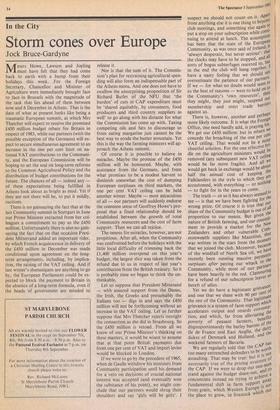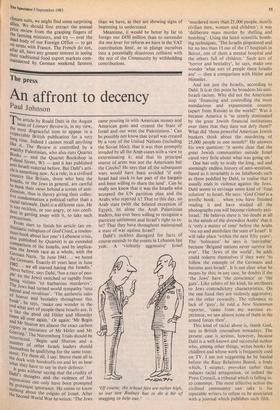In the City
Storm cones over Europe
Jock Bruce-Gardyne
Messrs Howe, Lawson and Jopling must have felt that they had come back to earth with a bump from their holidays this week. For the Foreign Secretary, Chancellor and Minister of Agriculture were immediately brought face to face in Brussels with the magnitude of the task that lies ahead of them between now and 6 December in Athens. That is the date of what at present looks like being a traumatic European summit, at which Mrs Thatcher will expect to receive the promised £450 million budget rebate for Britain in respect of 1983, while our partners (with the possible exception of the Germans) will ex- pect to secure simultaneous agreement to an increase in the one per cent limit on na- tional VAT contributions to the Communi- ty, and the European Commission will be hoping to set the seal on long-term reforms to the Common Agricultural Policy and the distribution of budget contributions for the future. The chances of all — indeed any of these expectations being fulfilled in Athens look about as bright as mud. Yet if they are not there will be, to put it mildly, ructions.
There is no gainsaying the fact that at the last Community summit in Stuttgart in June our Prime Minister extracted from her col- leagues a commitment to pay us the £450 million, Unfortunately there is also no gain- saying the fact that on that occasion Presi- dent Mitterrand added an important rider, by which French acquiescence in delivery of the £450 million in December was made conditional upon agreement on the long- term arrangements, including, by implica- tion, the raising of the VAT ceiling. And if last winter's shenanigans are anything to go by, the European Parliament could be ex- pected to block the payment to Britain in the absence of a long-term formula, even if the heads of government are minded to
release it.
Nor is that the sum of it. The Commis- sion's plan for restraining agricultural spen- ding will also form an indispensable part of the Athens menu. And one does not have to swallow the unsurprising proposition of Sir Richard Butler of the NFU that 'the burden' of cuts in CAP expenditure must be 'shared equitably, by consumers, food producers and third country suppliers as well' to go along with his distaste for what the Commission has come up with. Taxing competing oils and fats to discourage us from eating margarine just cannot be the best way to erode the butter mountain. Yet this is the way the farming ministers will ap- proach the Athens summit.
Of course it is possible to believe in miracles. Maybe the promise of the £450 million will be honoured. Maybe, with assistance from the Germans, and from what promises to be a modest harvest to diminish somewhat the cost of dumping European surpluses on third markets, the one per cent VAT ceiling can be held another winter. Maybe — most miraculous of all — our partners will suddenly endorse the common sense of Geoffrey Howe's pro- posal that a fixed relationship should be established between the growth of total Community resources and the cost of farm support. Then we can all rejoice.
The omens for miracles, however, are not propitious. After all, when the Community was confronted before the holidays with the little local difficulty of trimming back the £1,400 million overspend on this year's budget, the largest slice was taken from the refund due to us in respect of last year's contribution from the British treasury. So it is probably time we began to think the un- thinkable.
Let us suppose that President Mitterand — with assured support from the Danes, the Irish, the Greeks and presumably the Italians too — digs in and says the £450 million will not be forthcoming without an increase in the VAT ceiling. Let us further suppose that Mrs Thatcher rejects outright the connection as she did in Strasbourg. So the £450 million is vetoed. From all we know of our Prime Minister's thinking on these matters, it would be wisest to assume that at that point British payments due from one per cent of VAT and import levies would be blocked in London.
If we were to go by the precedent of 1965, when de Gaulle withdrew his ministers from Community participation until his demand for a veto on decisions of crucial national interest was accepted (and eventually won the substance of his point), we might con- clude that our partners would shrug their shoulders and say 'girls will be girls'. I
suspect we should not count on it. APO from anything else it is one thing to boycott club meetings, and something else again to put a stop on your subscription while coral' nuing to attend at lunch. The assumPticin has been that the state of the European Community, as was once said of Ireland, is `always desperate, but never serious': that the clocks may have to be stopped, and all sorts of bogus subterfuges resorted to, but in the end the club will hang together• have a nasty feeling that we should 11°I overestimate the patience of our partners' If we — for what no doubt would seem 10 us the best of reasons — were to hold on to the Community's 'own resources', then they might, they just might, suspend our
membership and erect trade barriers against us. There is, however, another and perhaPs
more likely outcome. it is what the Foreign Office, one need hardly add, is praying for We get our £450 million: but in return We concede the breaching of the one per cent VAT ceiling. That would not be a naldbre cheerful solution. For the one effective ri- dle on the agriculture ministers would he removed (any subsequent new VAT ceiling would be far more fragile). And all We would get back in exchange would be about half the annual cost of keeping the Falklanders in the style to which they are accustomed, with everything — or nothing — to fight for in the years to come. The truth — or so it has always seemed i° me — is that we have been fighting for the wrong prize. Of course it is true that our. share of the Community budget is out of all proportion to our means. But given the nature of British farming, and our commit- ment to provide a market for the Nevi Zealanders and other vulnerable Cdiw monwealth suppliers like Mauritius, that was written in the stars from the moment .n that we joined the club. Moreover, becall'''' of the windfall of North Sea oil, we have recently been running massive PaYrnertkts surpluses after paying our whack to the Community, while most of our partners have been heavily in the red. Clamouring for a refund of our subscription leaves " bereft of allies.
Yet we do have a legitimate grievance:
and one that we share with 90 per cent of the rest of the Community. That legitimate grievande is a system of farm support Will° accelerates output and retards consume" tion, and which, far from alleviating the poverty of peasant farmers, boleti" disproportionately the barley baronshe of iiirve Ile de France and East Anglia, t dukes of Denmark and Holland, and the
weekend farmers of Bavaria. has We are regularly told that the CAP
too many entrenched defenders to be won": assaulting. That may be true: but it is not necessarily true of the pricing structured. the CAP. 1 f we were to drop our one- one-m' stand against the budget share-out, and to concentrate instead on trying to achieve!, fundamental shift in farm supportavvaolt, from grain, which. Western Europe is n the place to grow, to livestock which our climate suits, we might find some surprising allies. We should first extract the annual price review from the grasping fingers of the farming ministers, and try — over the dead body of our Foreign Office — to get on terms with France. The French do not, after all, have any greater interest in seeing their traditional food export markets com- mandeered by German weekend farmers
than we have, as they are showing signs of beginning to understand.
Meantime, it would be better by far to forego our £450 million than to surrender the one lever for reform we have in the VAT contribution limit, or to plunge ourselves into a potentially disastrous collision with the rest of the Community by withholding contributions.



































 Previous page
Previous page